Getting Intimate with…
Georgia Chapman
April 28, 2023
Interviewed by Laura Clarke
At only 26 years old, Georgia Chapman (she/her) was diagnosed with the most aggressive form of breast cancer, underwent a double mastectomy, froze her eggs, and tested positive for a harmful variant of the BRCA genes — a hereditary version of the gene that greatly increases one’s chance of developing breast and ovarian cancer.
In this month's Getting Intimate, Georgia shares her experiences of navigating sex and relationships during the physical and mental toll of cancer, getting acquainted with her new self after surgery, and making big decisions about children when she wasn’t sure what it was she wanted…
You discovered a lump in your breast while you were getting ready for your 26th birthday. Can you tell us about that initial discovery and the first steps to diagnosing your cancer?
I was having a Zodiac-themed birthday party on Zoom during lockdown. Before the party, I was in the shower, and I found this really big, solid, golf ball-sized lump. It wasn't there the day before — at all. And I knew it wasn’t normal right away. I didn't think, "it's definitely cancer", I just thought it was a bit weird.
I went to the GP, who admitted it was big, but she wasn’t too concerned because it was smooth and round, which is a good sign. She said, "I think it's a hormonal cyst, which is pretty normal for people your age. It's definitely not the C-word."
She told you it definitely wasn't cancer?
Yes, but she did refer me to the breast clinic because of the size. I was told I’d need to get the cyst aspirated, which is getting it drained, and then I could just carry on.
I went to the breast clinic, and I remember being really shaken, to be honest. It really hurt. When they pushed down on my breast, I could feel everything draining out. And I remember just crying. They told me they’d see me in two weeks, just to see how it's healed up, and that I should be fine. So I didn't think anything of it at all.
But then, two days before I was due to go back for my checkup, I was getting ready to go to the gym, and suddenly I had shooting pains in my chest, and my boob literally doubled in size. I went back to the breast clinic, and they decided to do a needle biopsy and a mammogram just to rule anything out. Two weeks later, I was told I had breast cancer.
The consultant said I had Stage 3 triple-negative breast cancer and that if I’d left it a couple more weeks, I would have been Stage 4. It was literally like the floor fell beneath me. Then I had to have another mammogram because, even within two weeks, the cancer had progressed and grown. It was 8cm in circumference. So it was massive.
Did they tell you at that point that it was the most aggressive type of cancer?
Yes. She didn't sugarcoat it. I was told my treatment plan — that I was going to have to have chemotherapy, then surgery, and then radiotherapy. I was also told I would be tested for the BRCA genes to see if it's genetic because it's so uncommon in younger people, but it's becoming more common. I was the youngest person they'd had in that hospital at the time.
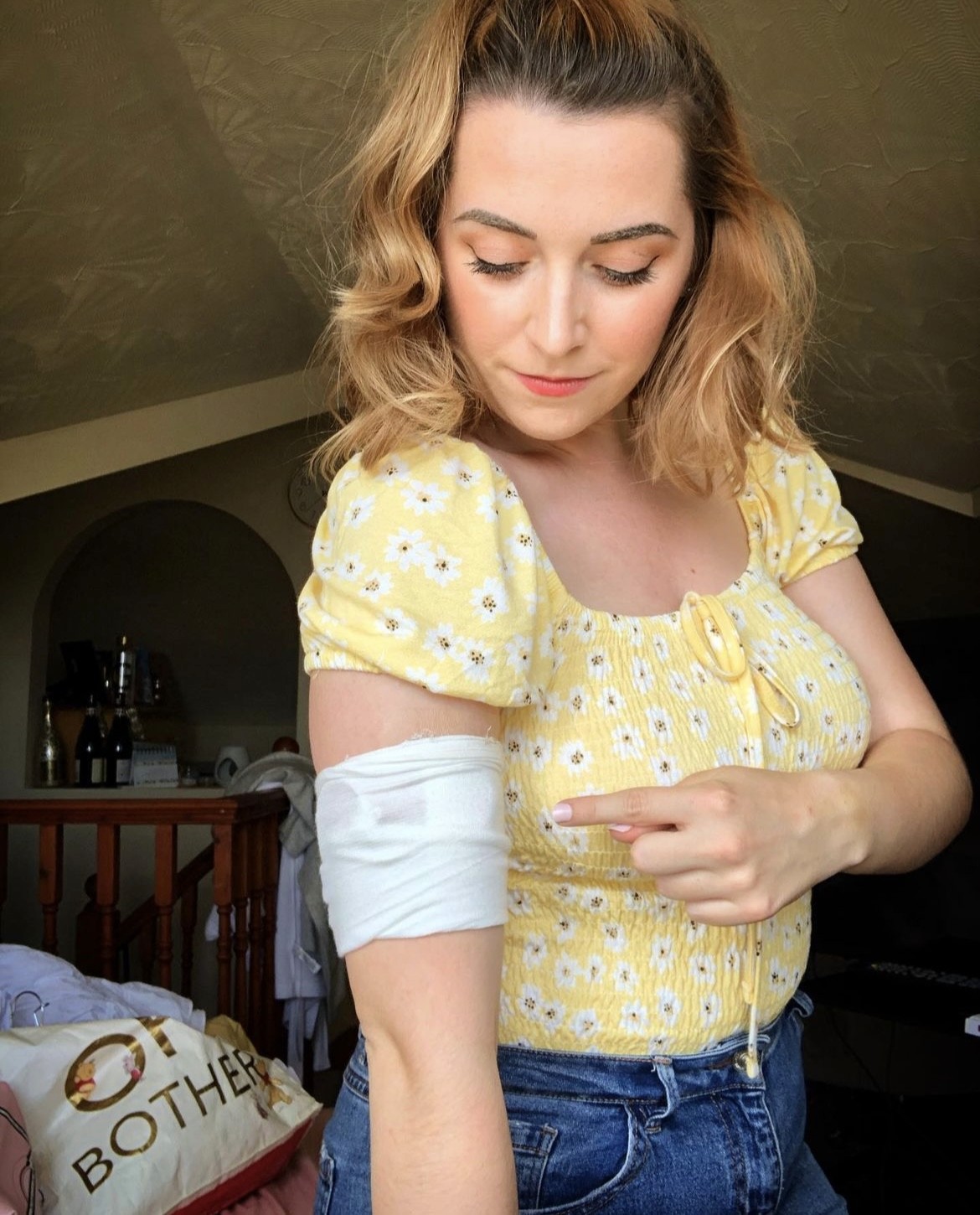
Among all of that trauma, you were told that there was a chance that your treatment could cause infertility, and you went through the process of getting your eggs frozen. What was that like emotionally?
I didn't know that chemo could make you infertile. I had no idea. My nurse called me at work and asked if I wanted kids one day. Bear in mind, me and my partner at the time had only been together for two months. I said, "I don't know, maybe one day. Why?" She told me chemo can make you infertile and that I needed to make this decision now because in twelve days I’d be starting my chemo treatment. I had to decide right there on that call and then go to the hospital the same day to pick up the injection, which is very much like IVF, where you do self-injections to get you producing loads of eggs.
I remember it taking about an hour to do the first injection because I had a full-blown meltdown, thinking, "this is the beginning of all of it. This is the first drug to go into my body; there's no going back." They also asked me if I wanted eggs or embryos frozen, and I said, "eggs!"
Of course, if you're that early on in your relationship, then you just don't know...
I remember saying to my partner, "I love you, but no". I know people whose marriages have fallen apart during treatment, and they only opted for embryos, so the only future babies they may have are with their ex-partner. So I was like, "eggs!" (Laughs)
It's like you're forced to make all of these choices for the future in the present when you're going through such a difficult time physically and emotionally and are probably not in the best place to be making any huge decisions!
Although it was quite funny because, even though I chose eggs, my partner had to give a sperm sample as they wanted to confirm the strength of his sperm should we in the future decide to do IVF.
So you were in a 2-month-old relationship, and you were suddenly taking action towards potential future children?
Yes. I'm lucky that we were friends for twelve years before we got together — we already knew each other. If it was anyone else, like if I'd met a random person on Tinder and things were going great and then this happened, it might have been totally different!
I was also asked what contraception I was on — I was on the Mirena coil, and I was told I might want to have it taken out so when I finish treatment, I'll know if my periods have come back, and then they'll know if I'm fertile or not.
I just have to make peace with the fact that I may or may not have children. I remember my partner and I having a conversation about whether, if I conceived naturally, would I continue the pregnancy? And I said no. That was when I found out I had the BRCA gene.
Can you tell me more about what the BRCA gene means for you and any future children you may have?
Finding out I had the gene made me feel less angry because at least there was an answer. And now my mum has also found out that she's a carrier of the gene — it gets passed on 50/50. So if I had a child naturally, it could have it or it might not, but I wouldn't want to conceive naturally knowing I could pass it on.
So with the eggs you've had frozen, they're able to determine which eggs carry the gene and which don't, so you can be selective?
Yes. And they only made that discovery in 2021. So now they can look at the eggs and know which ones have the gene and which ones don't.
To prevent the cancer from reoccurring, you also had a double mastectomy. For many, breasts are so linked to a sense of intimacy and sexuality — was this your experience, and if so, how did you feel during this loss?
It was a bit of a love-hate relationship with my breasts after diagnosis, because I used to love them and then I hated them because I was like "you're trying to kill me!". (Laughs) I do remember being in the hospital and going to the toilet before the operation. I literally gripped my boobs (laughs) and said goodbye to them.
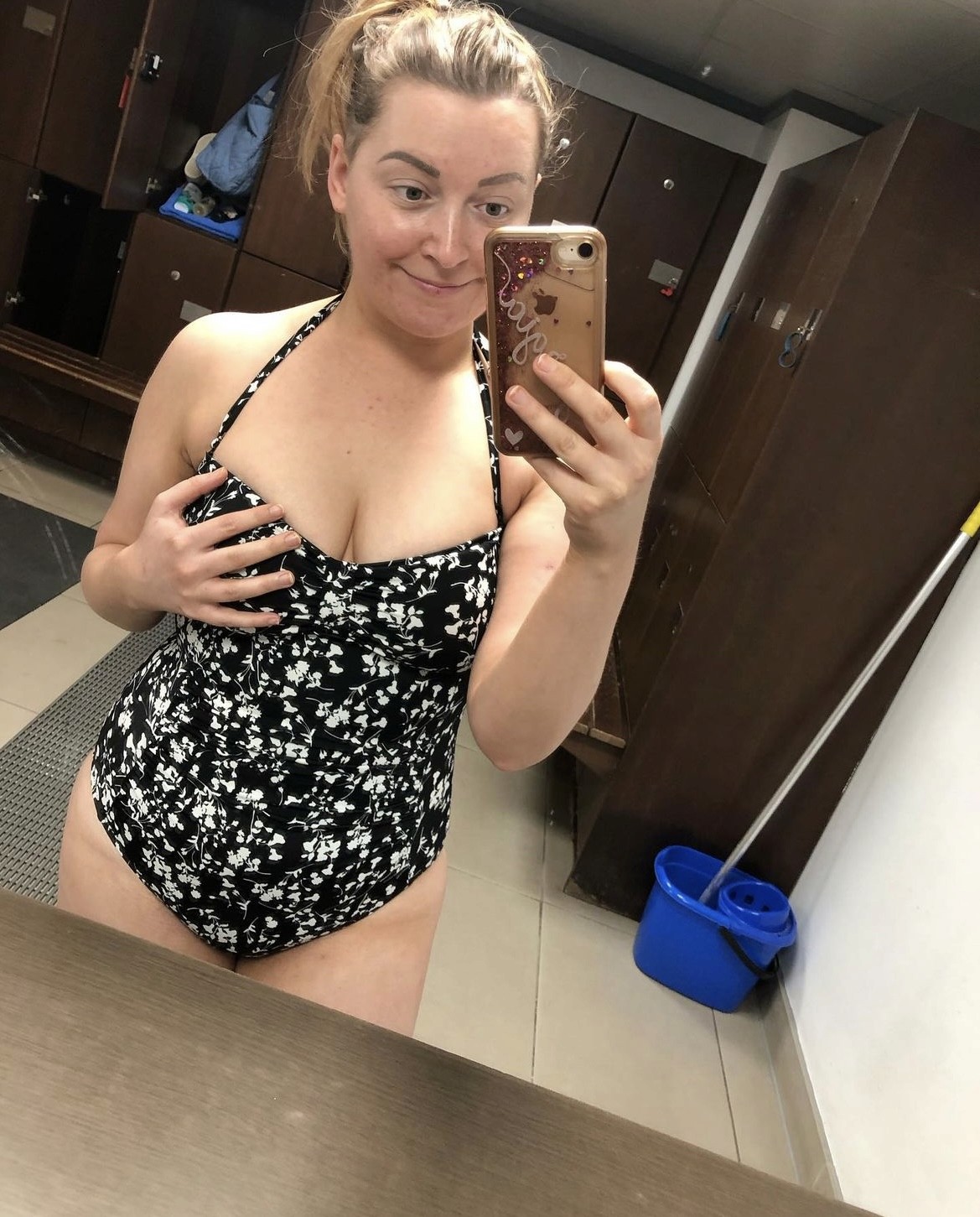
After the chemo, the tumour was pretty much gone. And I remember wondering if I really needed the surgery. But I knew I had to do it because it reduces my chances of getting cancer again from 80% to 7%.
It's that choice of removing your breasts or living with the anxiety of the cancer reoccurring.
Yeah. It was very hard because when you have chemo, your hair is falling out and your face is swollen from steroids. I gained about two and a half stone. I just didn't really recognise myself. But my partner never made me feel ugly, different, or undesirable, and we still had a great sex life. That was really reassuring.
Before your operation, they show you a slideshow of all the different types of scars that you could wake up with, and you don't know what your chest is going to look like until you wake up. I just hoped the scars were going to be neat. I remember waking up, and the nurse pulled the curtain around, picked up a mirror, and said, "right, I'm going to take off your robe, and we're going to look at it." When she undid my robe, I was so surprised — in a good way! I just remember thinking, "wow, it's really neat! I can deal with this". It was weird. I didn't feel emotional. I actually felt like "this is good".
I will admit, I miss wearing really nice lingerie. But they take you boob shopping! There's a big cupboard full of fake boobs (laughs) from the smallest of sizes to the biggest, but if I'm honest, I haven't worn them at all. It's easier to just be flat.
So you're given options for temporary boobs before your reconstruction?
Yes. They give you aqua boobs, which are for the gym and swimming, and then you have your normal boobs for daily life, but I don't bother — they're just heavy!
But when my relationship ended, I had a meltdown. I had to go to therapy because I couldn't imagine explaining everything to someone new. And it's not like you could just have a one-night stand because it's a bit of a mood killer.
There's a bit of an elephant in the room.
Yeah, you take off your top, and there's nothing there. And then you have to explain. And there are also discussions when dating like, "would you want kids one day? Because I've got this gene, and this is how it has to be." And you wonder if you should mention it or how early you should mention it.
Also, I remember feeling so angry at my ex because there was nothing wrong with him. He can go off and meet anyone else. But I've got to explain everything. And that's been the most difficult part of it all, if I'm honest. I think when the future was so uncertain, having that future plan with my ex got me through. And now that things haven't worked out, I don't know what the future holds. But I haven't got any hatred towards him — nothing like that. He was incredible. If someone has cancer and their partner needs advice, my ex is the person to go to! (Laughs)
It's so lovely to hear you say that — it shows that even when things don't work out, you can still have a really positive experience of being with somebody and positive memories.
Yeah, some people come into your life; they serve a purpose; they're just not meant to stay.
Tell me a bit more about your reconstruction — what does that involve?
I'm having a procedure called DIEP flap, which is where they take your stomach fat and put it up to your chest. And they really feel like boobs; they're warm because it's your own fat. It's got blood flow, and your body's not going to reject it. If you have an implant, because it's a foreign body, lots of people's bodies reject it.
Talking about sex and intimate body parts is still such a taboo — do you feel that this is enough support for those who have experienced mastectomies to help them regain a sense of sexual confidence and a fulfilling sex life in recovery?
No! I did go to a really good talk at my local Maggie's Centre. Maggie's is amazing. They hold a young women's group, and they invite guest speakers every month to do different things. And we had one lady who came in to talk about the menopause because treatment puts you into menopause. She was showing us different dilators, different lubes, and different things that are best for your new body.
Also — this is a really funny thing — when I was in chemo, my hair would fall out whenever I orgasmed! (Laughs) And I remember thinking, is this worth it? Yes, it is! (Laughs again)
(Laughs) Oh wow! Do you know why that happened?
Yes, it's because of the heat! So you wear a cold cap during treatment to restrain your hair from falling out, and that's because heat comes out of your head and makes your hair fall out. And I remember after every time we had sex, we'd end up peeling hair off the pillows — we had to use a lint roller all of the time!
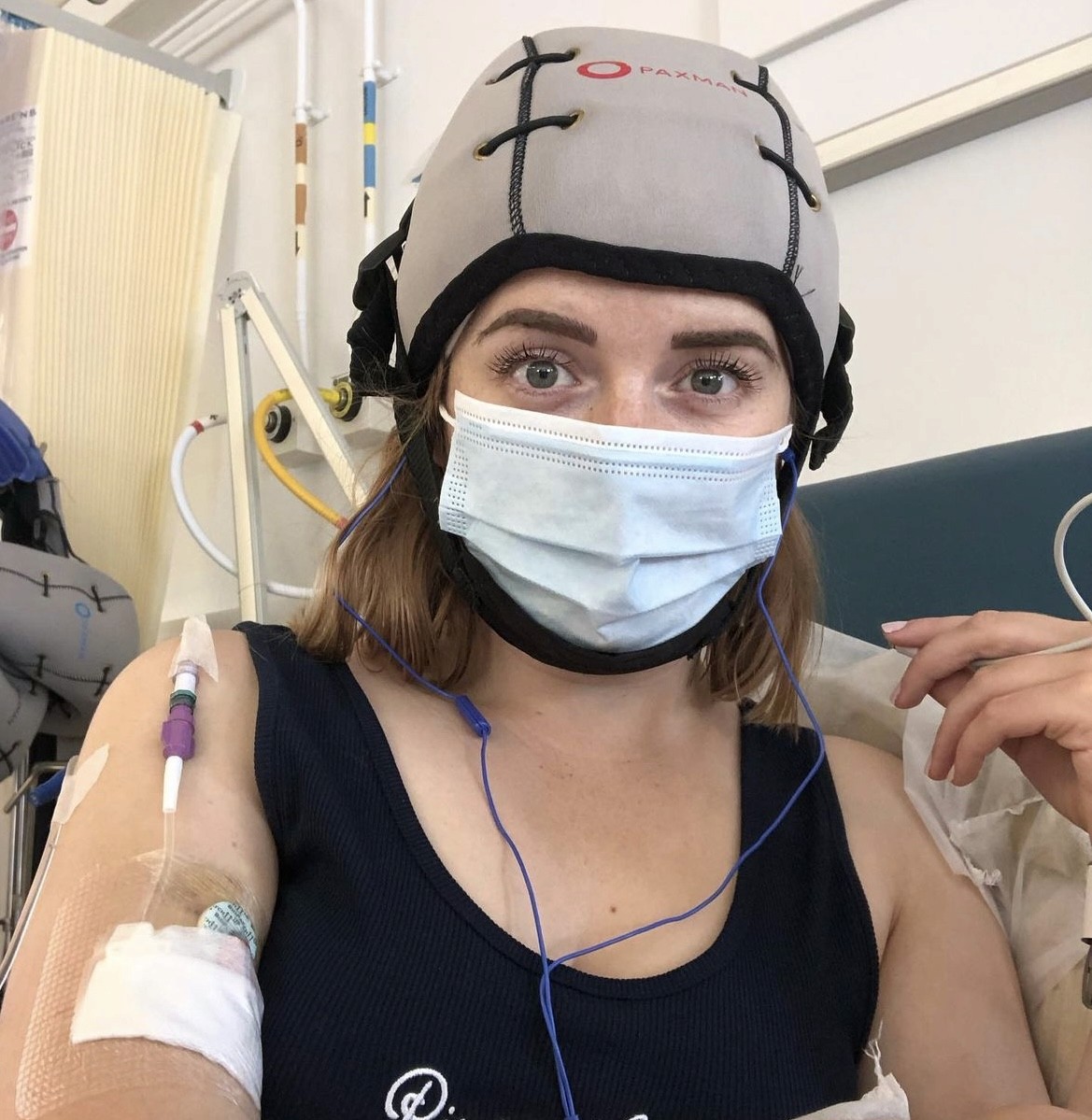
The body positivity movement is everywhere right now. Do you feel pressure to love your body and to think only positive thoughts when you're actually still in a period of mourning and adjustment? A “toxic body positivity” as it were?
From non-cancer friends, yes. You feel it from people who haven't been through it. They just really want you to kind of go back to your old self. From my cancer friends and the counsellors that I speak to, there's more of a sense that everything you feel is valid and totally understandable. It is a change. It's no longer what is considered "normal" and that's okay.
I do get a lot of toxic positivity around being cancer-free — people wonder why I'm not just happy because it's over. But it isn't. It's not how it works. It's a trauma. And it's not black and white. Some days I feel great, and some days I mourn my old self.
What helps you feel connected to the person you were before this ordeal?
Honestly, going to see my university friends because they were amazing throughout all of it. When you have a cancer diagnosis, you find out who your friends are. My uni girls were consistent all the way through. These are girls who've known me for ten years, and they knew me pre-relationship, crazy uni me, relationship me, break-up me. And when I'm with them, I feel complete.
I know I'll never be the same young woman I was before, but I'm more evolved now. It's just being around the right people. People who bring you good, positive vibes without it feeling forced. The people who can be sad with you are the ones who will lift you up as well.
Speaking of some of the positives that have come from this journey, your decision to share your story has led to some incredible experiences for you. Can you tell me about your work with Cancer Research and Breast Cancer Now?
The first opportunity that came up was with Cancer Research UK, who I'm now an ambassador for. We did a photoshoot at Winter Wonderland, and the photos and my interview were released in the press, on their website, and in newspapers. And then I was asked if I'd be interested in being the very first Welsh voice for Race for Life. I was like, "hell, yeah!" I mean, when do these opportunities ever happen? I call it glittering a turd. (Laughs)
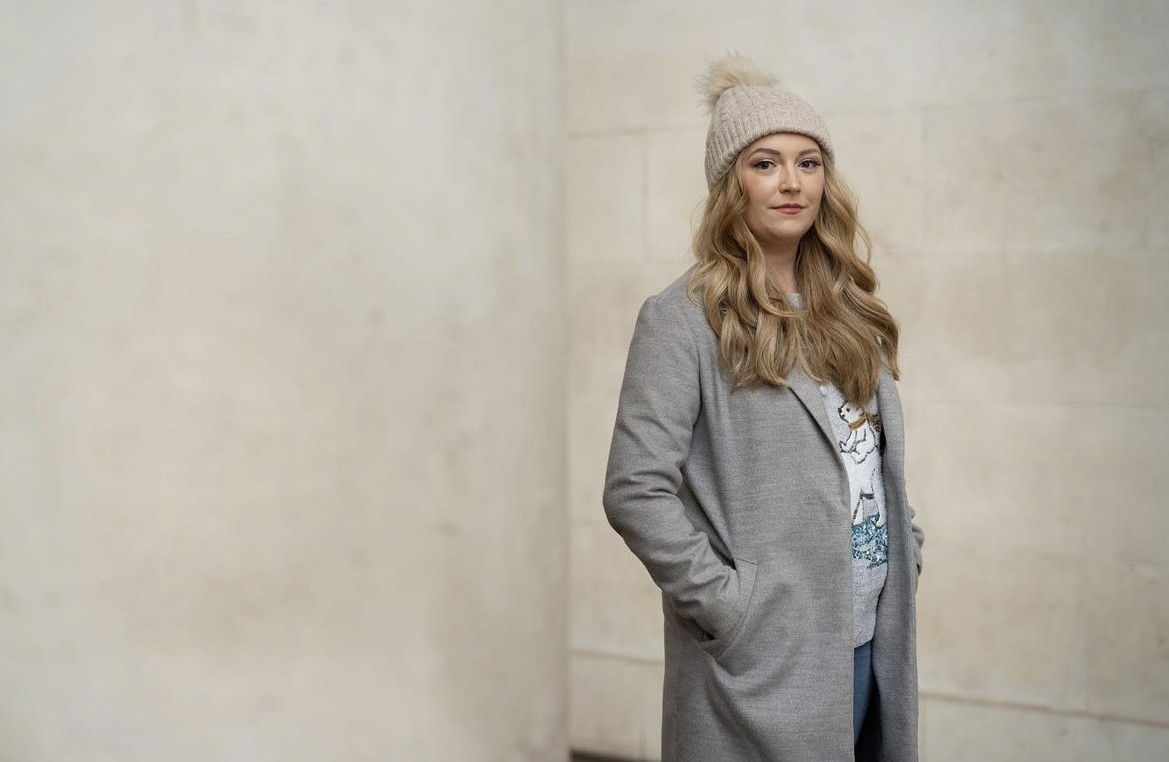
They then invited me to a big Cancer Research event where I met CEOs, lead nurses, oncologists, and scientists from all around the UK. I got to stand up in front of about 200 people and tell my story. It was quite emotional.
Then, after my breakup, I was feeling really down. I suddenly felt like no one would love me or want me again. I'm on Breast Cancer Now's email list for opportunities, and one came up to be a model in The Show, and I knew that I didn't have anything to lose. I had to write my story, and when they asked why I was applying, I said, "because I've just been broken up with and I feel really sh*t. I need a boost, and I really want to feel beautiful again." I got a phone call a week later saying they had over 350 applicants, and I was chosen along with 23 others.
I think the more we talk about it, the more people will receive a prompt diagnosis. Now that I blog my journey, I get inboxes all the time from women who have just been diagnosed saying, "I've just been recommended your page by my oncologist, by my nurses. Thank you for being so honest."
Does that make it all feel worth it? Putting your story out there?
100%. It gives me purpose. I am so passionate about this cause; that's why I'm so open about it. Cancer doesn't discriminate. It doesn't care what job you have or how attractive you are; it doesn't care about anything; it'll just happen.
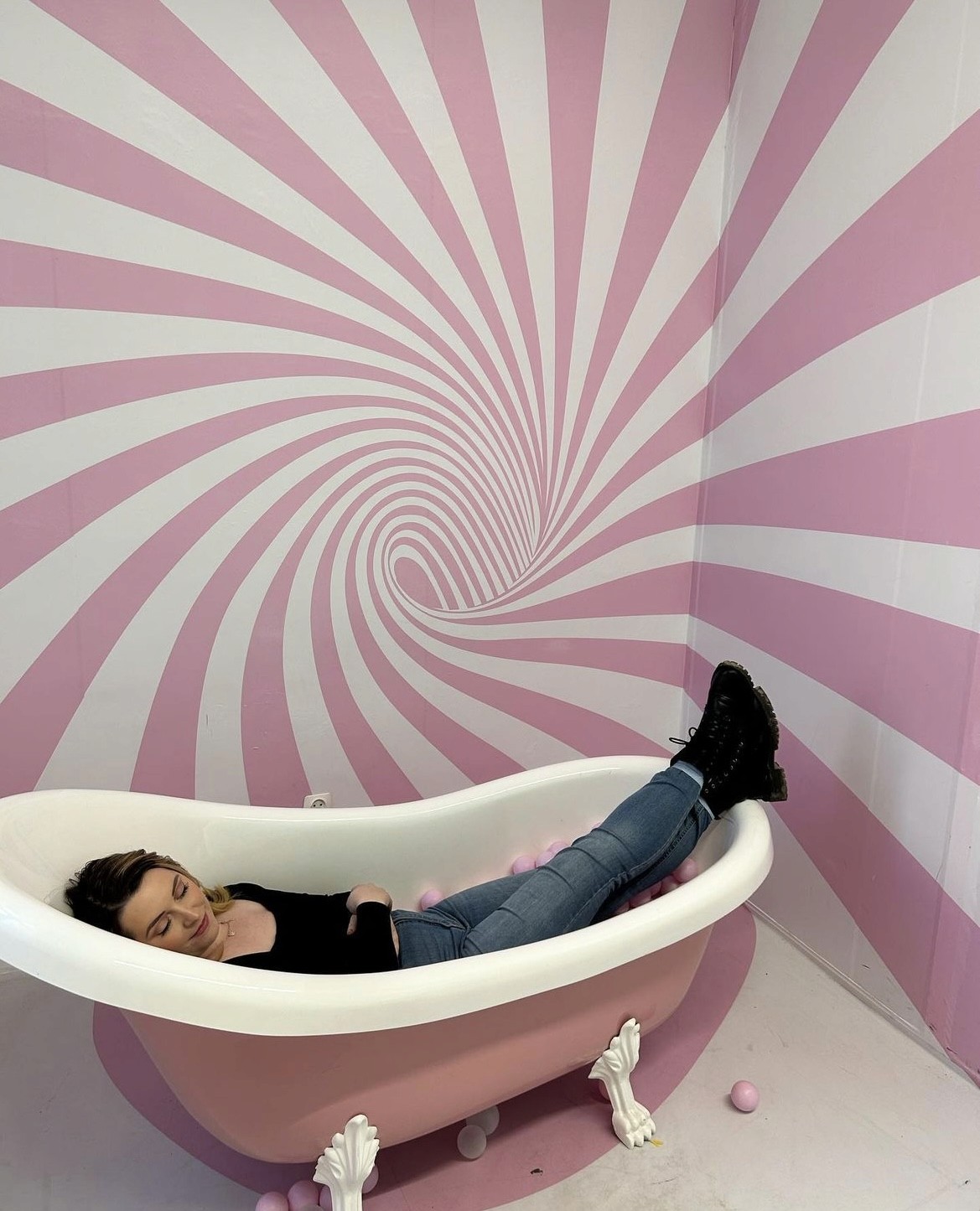
Finally, what was a question that you had at the start of this journey, and could you answer it now for anyone who is wondering the same thing?
I had two questions. First question: is my hair going to fall out? Second question: can I drink alcohol? Genuinely!
Whatever breast cancer treatment you have, you will have hair loss. There is no treatment that does not cause hair loss. And as for alcohol, you can drink, but nothing with grapefruit or citrus because it counteracts the chemotherapy drugs.
Also, Starburst is brilliant for chemo mouth! Chemo makes your mouth taste metallic, and you can brush your teeth four times a day and still not be able to get rid of it. But Starburst works, no problem! (Laughs)
Getting Intimate is the blog series where we interview people making a difference in the world of sex, relationships, gender and feminism. Read more interviews here.
If you want to stay updated on Georgia’s recovery journey, you can follow her on Instagram (@georgiabeth_welshfairy)
For more sex and relationships content, follow My Body & Yours on Instagram (@mybodyandyours)
Interview Date:
March 13, 2023
